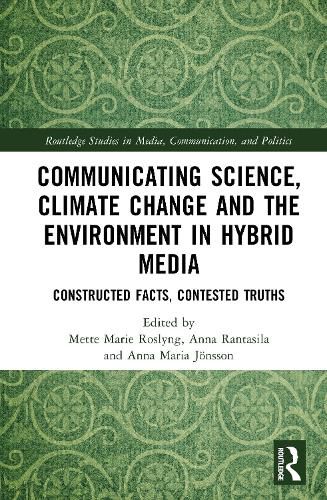Readings Newsletter
Become a Readings Member to make your shopping experience even easier.
Sign in or sign up for free!
You’re not far away from qualifying for FREE standard shipping within Australia
You’ve qualified for FREE standard shipping within Australia
The cart is loading…






This volume examines how a new hybrid mediascape represents and contributes to the construction of facts and knowledge in relation to science, environment, and climate controversies, providing a new, critical perspective to the bourgeoning field of science and environment communication.
Arguing that science must be understood from an inclusive perspective, respecting public values and concerns alongside scientific arguments, the authors demonstrate how this will allow us to properly understand the role of science, truth, and factuality alongside the ethical, cultural, and political concerns about science raised in different publics. The chapters focus on the more controversial aspects of science and environmental communication: misinformation, public understandings of science and the environmental crises, vaccination, and the role of the hybrid mediascape in science, environment, and climate conflicts.
Offering a much-needed interdisciplinary approach to understand the role of science of media in science and environment conflicts, this book will appeal to students and academics in the areas of media and communication, journalism, cultural studies, science, environment and risk communication, and digital media studies, as well as sociology and political science.
$9.00 standard shipping within Australia
FREE standard shipping within Australia for orders over $100.00
Express & International shipping calculated at checkout
This volume examines how a new hybrid mediascape represents and contributes to the construction of facts and knowledge in relation to science, environment, and climate controversies, providing a new, critical perspective to the bourgeoning field of science and environment communication.
Arguing that science must be understood from an inclusive perspective, respecting public values and concerns alongside scientific arguments, the authors demonstrate how this will allow us to properly understand the role of science, truth, and factuality alongside the ethical, cultural, and political concerns about science raised in different publics. The chapters focus on the more controversial aspects of science and environmental communication: misinformation, public understandings of science and the environmental crises, vaccination, and the role of the hybrid mediascape in science, environment, and climate conflicts.
Offering a much-needed interdisciplinary approach to understand the role of science of media in science and environment conflicts, this book will appeal to students and academics in the areas of media and communication, journalism, cultural studies, science, environment and risk communication, and digital media studies, as well as sociology and political science.